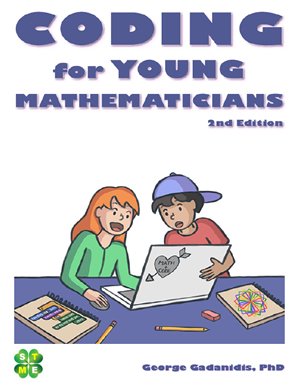
Coding for Young Mathematicians (2nd Edition) is packed with ideas, classroom-tested and classroom-ready activities, along with online resources and extension material for grades 1-8.
License this book as a PDF for you, your school or school district and, once purchased, you will also have the right to copy and use it in your classroom.

Licensing:
You can purchase and download this book immediately as a single user license or school-wide license: BUY NOW
Comments from Teachers and Students:
The following are comments from teachers and students after taking part in their first math + coding activity from Coding for Young Mathematicians:
Grade 1 teacher:
"I was so excited that everybody in that room was successful. From my little children that haven't been in the country for the whole year, that have only been in school for a few months, they were successful, viewing themselves capable, able - and mathematicians." "In the Grade 1 room it was great to see the older kids with the little kids and their little hands just hovering above the keyboard and sometimes they'd pull them down and [the older] kids were so beautiful at saying, 'No you use your hands, you're going to do it.'"
Grades 2-3 teacher:
"What I really loved was the connection we made with the families at home. We said to the kids, this in now your project and you now need to share this. Kids were sceptical that their parents could do it, but they came back excited to share what they did with them."
Grades 7-8 students:
"I felt very curious in today's class because I had never used coding or even heard of it."
"It was difficult at first but then I understood it."
"It was very interesting and I got sucked right in."
Math + Coding Animation:
Watch this animation based on one of the activities from Coding for Young Mathematicians:

Author:
 George Gadanadis is a Professor of Education at The University of Western Ontario and a Fellow of the Fields Institute for Research in Mathematical Sciences. George spends typically 50-60 days annually in K-8 classrooms, collaborating with teachers to design better ways to engage children with mathematics. His work and research has been distilled into this activity resource book that explores mathematics and coding together, partnering one with the other from the outset rather than as alternatives.
George Gadanadis is a Professor of Education at The University of Western Ontario and a Fellow of the Fields Institute for Research in Mathematical Sciences. George spends typically 50-60 days annually in K-8 classrooms, collaborating with teachers to design better ways to engage children with mathematics. His work and research has been distilled into this activity resource book that explores mathematics and coding together, partnering one with the other from the outset rather than as alternatives.
Background:
Digital technologies are part of our daily lives - we all use them but few people create them. Coding (or computer programming) is the process used to create and control the apps, video games and other digital artefacts around us.
When young children learn to code, they learn to become producers as well as consumers of technology, to better understand and control their technological world and to be better prepared to succeed in it.
Coding is a natural fit with mathematics and offers these advantages: it makes math concepts "tangible", it models them dynamically and it gives students opportunities to be in control.